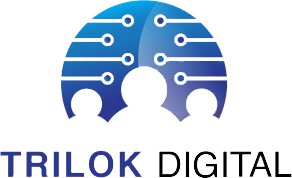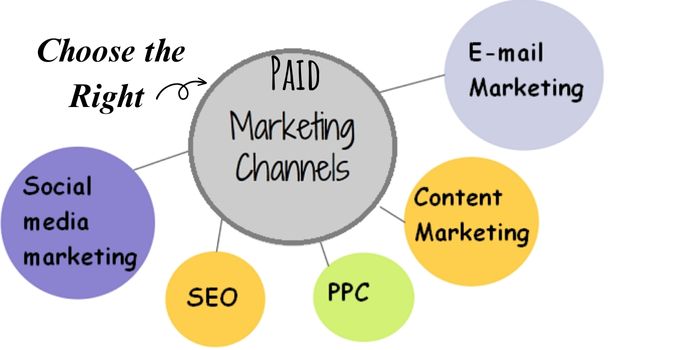In a rapidly evolving digital landscape, selecting the right paid marketing channels is the cornerstone of a successful growth strategy for any business.
This insightful blog delves deep into the world of paid advertising, providing expert guidance on identifying the most suitable channels to reach your target audience and maximize ROI.
From search engine marketing (SEM) to social media advertising, display ads, and beyond, this blog dissects each paid channel’s unique advantages and target demographics.
Uncover the crucial factors to consider when allocating your marketing budget, such as industry type, customer behavior, and campaign objectives, while also learning how to fine-tune your approach for different stages of the customer journey.
Our seasoned marketing experts share invaluable tips on testing and analyzing the performance of various paid channels, empowering you to make data-driven decisions that boost conversion rates and drive revenue.
This blog equips you with the knowledge and tools to navigate the intricate landscape of Paid Marketing Channels, ensuring your advertising efforts are efficient, cost-effective, and in sync with your brand’s vision.
What are marketing Channels and Their Functions?
Marketing channels refer to the various platforms and methods that businesses use to reach and engage with their target audience to promote their products or services.
These channels are essential for distributing marketing messages and influencing customer behavior.
Paid marketing channels can be classified into two main categories: traditional marketing channels and digital marketing channels.
1. Traditional Marketing Channels:
- Television: Advertisements aired on television networks to reach a broad audience.
- Radio: Advertising on radio stations, often used for localized targeting.
- Print Media: Advertising in newspapers, magazines, brochures, flyers, and sending marketing messages directly to people’s homes.
- Outdoor Advertising: Billboards, posters, and signage placed in high-traffic areas.
- Events and Trade Shows: Participating in industry-specific events to showcase products and network with potential customers.
- Direct Sales: Personal selling through door-to-door sales or telemarketing.
2. Digital Marketing Channels:
- Search Engine Marketing (SEM): Paid advertisements on search engines like Google or Bing.
- Social Media Marketing: Promoting products or services means telling people about them and trying to get them interested in buying or using them. This is done on social media platforms like Facebook, Instagram, Twitter, LinkedIn, and others.
- Content Marketing: Making and sharing useful content to get the attention and interest of the people you want to reach.
- Email Marketing: Sending promotional messages and newsletters to a targeted email list.
- Affiliate Marketing: Partnering with affiliates or influencers to promote products and earn commissions on sales.
- Display Advertising: Banner ads, pop-ups, and other visual ads displayed on websites.
- Video Marketing: Sharing promotional videos on platforms like YouTube.
- Influencer Marketing: Collaborating with influencers to leverage their audience and reach.
- Mobile Marketing: Marketing messages delivered through mobile devices, including SMS and in-app advertising.
Selecting the right marketing channels depends on factors like the target audience, budget, industry, and marketing objectives.
An effective marketing strategy often involves a combination of both traditional and digital channels to maximize the reach and impact of the marketing efforts.
What are Online Marketing Channels?
Marketing online channels, also known as digital paid marketing channels, refer to the various platforms and methods used by businesses to promote their products or services on the internet.
These channels have become increasingly popular due to the widespread use of the internet and the significant shift towards online consumer behavior.
Here are some of the usual ways businesses promote themselves online:
1. Search Engine Marketing (SEM) – This includes:
- Search Engine Optimization (SEO): Optimizing websites and content to rank higher in search engine results organically.
- Pay-Per-Click (PPC) Advertising: Placing ads on search engine results pages and paying for clicks on those ads.
2. Social Media Marketing:
- Facebook: Promoting your business on the biggest social media website.
- Instagram: Promoting products or services through images and videos.
- Twitter: Engaging with users through short messages and advertisements.
- LinkedIn: Targeting professionals and businesses with B2B marketing efforts.
- Pinterest: Showcasing products through visual pins and boards.
3. Content Marketing:
- Blogging: Creating and publishing valuable content on a blog to attract and engage an audience.
- Infographics: Using visually appealing graphics to convey information and promote products.
- Ebooks and Whitepapers: Offering in-depth content to generate leads and establish authority.
4. Email Marketing:
- Sending targeted and personalized marketing messages to a list of subscribers.
5. Affiliate Marketing:
- Affiliate marketing is when you team up with other people (affiliates) who help promote your products or services. In return, they get a commission for each sale they generate.
6. Display Advertising:
- Placing banner ads, pop-ups, or video ads on websites and apps.
7. Video Marketing:
- Using videos to promote products, educate customers, and entertain the audience.
8. Influencer Marketing:
- Collaborating with social media influencers to endorse products or services to their followers.
9. Mobile Marketing:
- Targeting mobile users through SMS marketing, in-app advertising, and mobile-optimized websites.
10. Online PR and Reputation Management:
- Managing the online reputation of the brand through media mentions and press releases.
Each marketing channel has its unique advantages and target audience. An effective digital marketing strategy typically involves a combination of these channels to reach a wider audience, generate leads, and achieve marketing objectives.
Businesses should carefully analyze their target market, budget, and marketing goals to determine which online channels are best suited for their needs.
What is an Example of a Digital Marketing Campaign?
Digital marketing campaigns encompass a wide range of strategies aimed at promoting products, services, or brands through online channels.
Some prominent examples of digital marketing campaigns include:
- Social Media Contests: Brands host interactive contests on platforms like Instagram or Twitter, encouraging users to participate by sharing content, tagging friends, or using branded hashtags. These campaigns increase brand visibility, engagement, and user-generated content.
- Email Newsletter Campaigns: Companies send out targeted and personalized newsletters to subscribers, delivering valuable content, exclusive offers, and updates. These campaigns help nurture customer relationships and drive repeat business.
- Influencer Partnerships: Collaborating with social media influencers or bloggers to endorse products or services can significantly expand a brand’s reach and credibility, especially among the influencer’s dedicated audience.
- Search Engine Optimization (SEO) Campaigns: Implementing SEO strategies to optimize website content, keywords, and metadata for better visibility on search engine results pages. This boosts organic traffic and improves the site’s overall search ranking.
- Pay-Per-Click (PPC) Advertising: Running targeted ad campaigns on search engines or social media platforms, where businesses pay only when users click on their ads. PPC campaigns can lead to immediate visibility and targeted traffic.
- Content Marketing Campaigns: Creating and distributing valuable and relevant content, such as blog posts, videos, infographics, and ebooks, to attract and engage the target audience. Content marketing positions a brand as an authority in its industry.
- Viral Marketing Campaigns: Crafting shareable and attention-grabbing content that quickly spreads across the internet through social sharing, increasing brand exposure exponentially.
- App Install Campaigns: Advertising mobile apps through targeted campaigns on various platforms, driving downloads and increasing user acquisition.
- Retargeting/Remarketing Campaigns: Serving ads to users who have previously visited a website or interacted with the brand, reminding them of products they showed interest in, and encouraging conversions.
Each digital marketing campaign is tailored to suit specific goals and target audiences, making use of various online channels to engage and convert potential customers into loyal brand advocates.
What is a Paid Search Management?
Paid search management refers to the process of planning, executing, and optimizing pay-per-click (PPC) advertising campaigns on search engines like Google or Bing.
It involves creating and targeting relevant keywords, writing compelling ad copy, setting bid amounts, and managing budgets to drive targeted traffic to a website.
The main goal of paid search management is to maximize the return on investment (ROI) by efficiently utilizing the allocated budget and ensuring that ads appear in front of the right audience at the right time.
Regular monitoring, analysis of performance metrics and continuous optimization are essential aspects of paid search management to achieve optimal campaign results and drive conversions for businesses.
How do I run a Paid Search Campaign?
A paid search campaign is an online advertising strategy where businesses bid on keywords related to their products or services to have their ads displayed prominently on search engine results pages (SERPs).
When users search for specific keywords, the ads appear at the top or bottom of the page, labeled as “sponsored” or “ad.” Advertisers pay only when users click on their ads, which are known as pay-per-click (PPC) advertising.
These campaigns are highly targeted, allowing businesses to reach their desired audience precisely when they are actively searching for relevant information.
The success of a paid search campaign depends on selecting the right keywords, crafting compelling ad copy, and optimizing landing pages to convert clicks into valuable leads or sales.
What Does AdWords Stand for?
“Managed AdWords” refers to a service provided by digital marketing agencies or professionals to optimize and run Google AdWords (now known as Google Ads) campaigns on behalf of businesses or individuals.
Google Ads is an online advertising platform that allows advertisers to create and display ads on Google’s search results pages, websites, and other Google platforms.
In a managed AdWords service, marketing experts handle various aspects of the campaign, including keyword research, ad creation, bid management, budget allocation, and performance tracking.
The goal of managed AdWords is to help businesses achieve better results from their advertising efforts, drive relevant traffic to their websites, increase conversions, and maximize return on investment (ROI).
With professional management, businesses can tap into the full potential of Google Ads and improve the effectiveness of their online advertising strategy.
Which Ads are used in Search Engines?
Search engine ads, also known as search engine marketing (SEM) or pay-per-click (PPC) advertising, are online advertisements displayed on search engine results pages (SERPs).
These ads appear when users conduct relevant searches using specific keywords or phrases. Advertisers bid on these keywords in auctions to have their ads displayed prominently.
Unlike organic search results, search engine ads are marked as sponsored and usually appear at the top or bottom of the search results. Advertisers are charged only when users click on their ads, hence the term “pay-per-click.”
Search engine ads offer businesses an effective way to reach their target audience, increase website traffic and drive conversions by displaying relevant ads to users actively searching for products or services related to their offerings.
Each paid marketing channel, comes with its unique strengths and target audience, so take the time to analyze your business needs, customer behavior, and campaign objectives.
Thank you for joining us on this journey, and may your business thrive and flourish in the digital landscape!
Should you have any further questions or need expert assistance, our team is always here to support your marketing endeavors.




